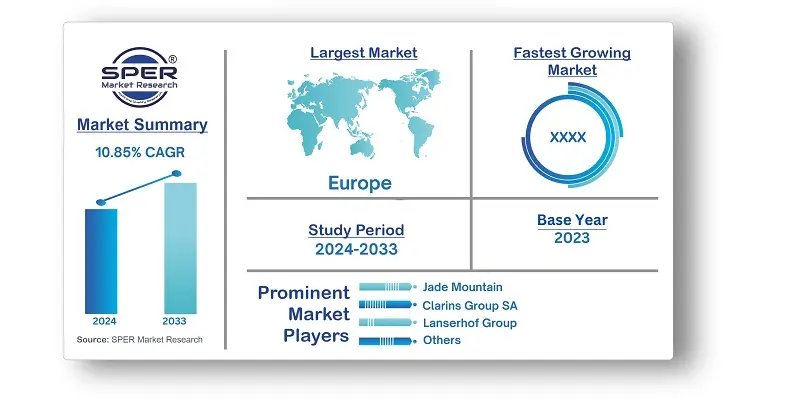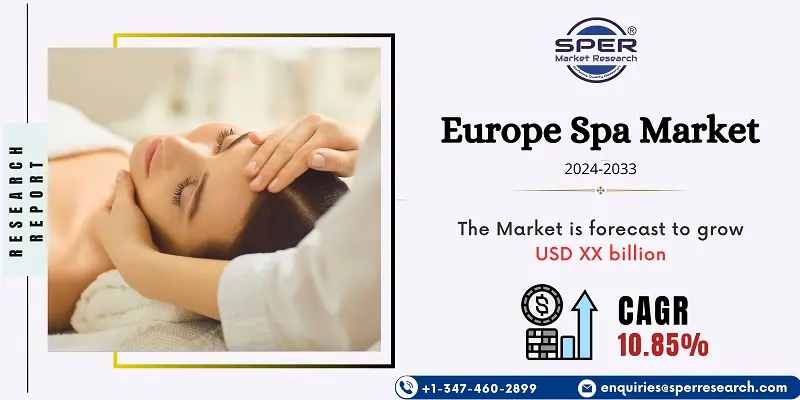
Europe Spa Market Growth, Size, Trends, Demand, Share, Revenue, Competition and Future Outlook
Europe Spa Market Size- By Service Type- Regional Outlook, Competitive Strategies and Segment Forecast to 2033
| Published: Jun-2024 | Report ID: FMCG24115 | Pages: 1 - 152 | Formats*: |
| Category : Consumer & Retail | |||

- Transition to In-Home Wellness Services and Goods: Numerous consumers are finding more affordable options for spa trips because to the introduction of smart at-home wellness products, gadgets, and digital platforms that offer guided relaxation and treatment sessions. People's predisposition to seek leisure and well-being within the confines of their own houses was made worse by the worldwide health crisis, which triggered lockdowns and health concerns. Convenient and frequently less expensive substitutes for traditional spa services are the DIY spa kits, wellness subscription apps, and telehealth consultations, which are growing in popularity. This change presents a significant threat to the established spa industry as consumers weigh the expenses, benefits, and security of in-person appointments against options that can be done at home.

| Report Metric | Details |
| Market size available for years | 2020-2033 |
| Base year considered | 2023 |
| Forecast period | 2024-2033 |
| Segments covered | By Service Type |
| Regions covered | France, Germany, Italy, Spain, United Kingdom, Rest of Europe |
| Companies Covered | Planet Beach Franchising Corporation, Four Seasons Hotels Limited (Cascade Investment, L.L.C.), ME SPE Franchising, LLC, Jade Mountain, Mandarin Oriental International Limited (Jardine Matheson Holdings Limited), InterContinental Hotels Group PLC, Clarins Group SA, Lanserhof Group, Belmond Maroma Resort & SPA, and Gaia Retreat & SPA (Tattarang). |
- Wellness Enthusiasts
- Luxury Travelers
- Health-conscious Individuals
- Corporate Wellness Programs
- Beauty and Skincare Aficionados
- Special Occasion Celebrators (Weddings, Anniversaries, etc.)
- Stress Relief Seekers
| By Service Type: |
|
- Europe Spa Market Size (FY’2024-FY’2033)
- Overview of Europe Spa Market
- Segmentation of Europe Spa Market By Service Type (Hotel/Resorts Spa, Day/Salon Spa, Destination Spa, Medical Spa, Mineral Spring Spa, Others)
- Expansion Analysis of Europe Spa Market
- Problems and Obstacles in Europe Spa Market
- Competitive Landscape in the Europe Spa Market
- Impact of COVID-19 and Demonetization on Europe Spa Market
- Details on Current Investment in Europe Spa Market
- Competitive Analysis of Europe Spa Market
- Prominent Players in the Europe Spa Market
- SWOT Analysis of Europe Spa Market
- Europe Spa Market Future Outlook and Projections (FY’2024-FY’2033)
- Recommendations from Analyst
1.1. Scope of the report1.2. Market segment analysis
2.1. Research data source
2.1.1. Secondary Data2.1.2. Primary Data2.1.3. SPER’s internal database2.1.4. Premium insight from KOL’s
2.2. Market size estimation
2.2.1. Top-down and Bottom-up approach
2.3. Data triangulation
4.1. Driver, Restraint, Opportunity and Challenges analysis
4.1.1. Drivers4.1.2. Restraints4.1.3. Opportunities4.1.4. Challenges
4.2. COVID-19 Impacts of the Europe Spa Market
5.1. SWOT Analysis
5.1.1. Strengths5.1.2. Weaknesses5.1.3. Opportunities5.1.4. Threats
5.2. PESTEL Analysis
5.2.1. Political Landscape5.2.2. Economic Landscape5.2.3. Social Landscape5.2.4. Technological Landscape5.2.5. Environmental Landscape5.2.6. Legal Landscape
5.3. PORTER’s Five Forces
5.3.1. Bargaining power of suppliers5.3.2. Bargaining power of buyers5.3.3. Threat of Substitute5.3.4. Threat of new entrant5.3.5. Competitive rivalry
5.4. Heat Map Analysis
6.1. Europe Spa Market Manufacturing Base Distribution, Sales Area, Product Type6.2. Mergers & Acquisitions, Partnerships, Product Launch, and Collaboration in Europe Spa Market
7.1. Europe Spa Market Size, Share and Forecast, By Service Type, 2020-20267.2. Europe Spa Market Size, Share and Forecast, By Service Type, 2027-20337.3. Hotel/Resorts Spa7.4. Day/Salon Spa7.5. Destination Spa7.6. Medical Spa7.7. Mineral Spring Spa7.8. Others
8.1. Europe Spa Market Size and Market Share
9.1. Europe Spa Market Size and Market Share By Region (2020-2026)9.2. Europe Spa Market Size and Market Share By Region (2027-2033)9.3. France9.4. Germany9.5. Italy9.6. Spain9.7. United Kingdom9.8. Rest of Europe
10.1. Belmond Maroma Resort & SPA
10.1.1. Company details10.1.2. Financial outlook10.1.3. Product summary10.1.4. Recent developments
10.2. Clarins Group SA
10.2.1. Company details10.2.2. Financial outlook10.2.3. Product summary10.2.4. Recent developments
10.3. Four Seasons Hotels Limited (Cascade Investment, L.L.C.)
10.3.1. Company details10.3.2. Financial outlook10.3.3. Product summary10.3.4. Recent developments
10.4. Gaia Retreat & SPA (Tattarang)
10.4.1. Company details10.4.2. Financial outlook10.4.3. Product summary10.4.4. Recent developments
10.5. InterContinental Hotels Group PLC
10.5.1. Company details10.5.2. Financial outlook10.5.3. Product summary10.5.4. Recent developments
10.6. Jade Mountain
10.6.1. Company details10.6.2. Financial outlook10.6.3. Product summary10.6.4. Recent developments
10.7. Lanserhof Group
10.7.1. Company details10.7.2. Financial outlook10.7.3. Product summary10.7.4. Recent developments
10.8. Mandarin Oriental International Limited (Jardine Matheson Holdings Limited)
10.8.1. Company details10.8.2. Financial outlook10.8.3. Product summary10.8.4. Recent developments
10.9. ME SPE Franchising, LLC
10.9.1. Company details10.9.2. Financial outlook10.9.3. Product summary10.9.4. Recent developments
10.10. Planet Beach Franchising Corporation
10.10.1. Company details10.10.2. Financial outlook10.10.3. Product summary10.10.4. Recent developments
10.11. Others
SPER Market Research’s methodology uses great emphasis on primary research to ensure that the market intelligence insights are up to date, reliable and accurate. Primary interviews are done with players involved in each phase of a supply chain to analyze the market forecasting. The secondary research method is used to help you fully understand how the future markets and the spending patterns look likes.
The report is based on in-depth qualitative and quantitative analysis of the Product Market. The quantitative analysis involves the application of various projection and sampling techniques. The qualitative analysis involves primary interviews, surveys, and vendor briefings. The data gathered as a result of these processes are validated through experts opinion. Our research methodology entails an ideal mixture of primary and secondary initiatives.



Frequently Asked Questions About This Report
PLACE AN ORDER
Year End Discount
Sample Report
Pre-Purchase Inquiry
NEED CUSTOMIZATION?
Request CustomizationCALL OR EMAIL US
100% Secure Payment






Related Reports
Our Global Clients
Our data-driven insights have influenced the strategy of 200+ reputed companies across the globe.




















